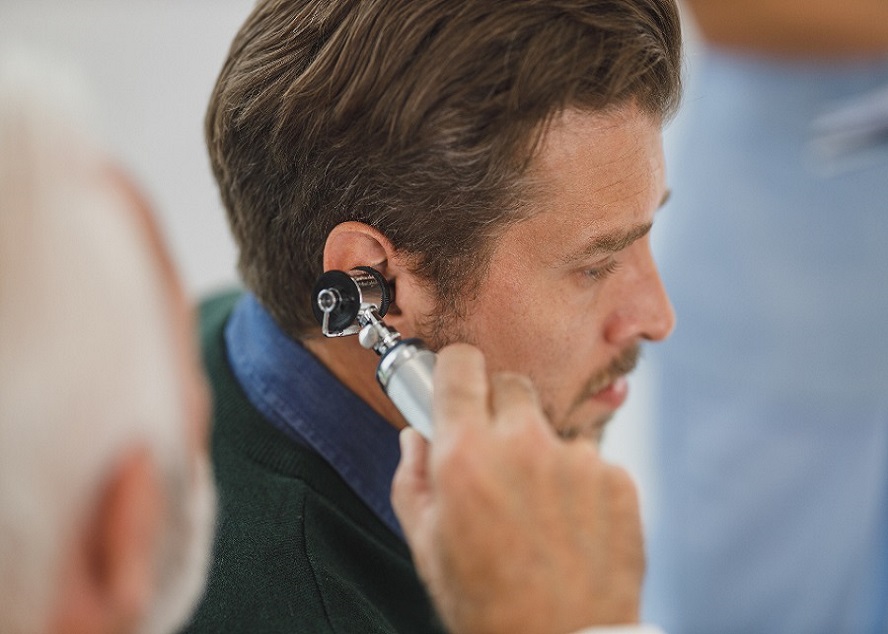
Have you ever wondered what types of tests are available to assess your hearing?
Or maybe you’ve heard about different tests but aren’t sure which one is right for you.
Well, you’re in the right place!
In this blog, we’re going to break down the various types of hearing tests so you can have a better understanding of what they entail and which one might be the best fit for your needs.
Before diving into the specifics, let’s talk about why hearing tests are necessary. Simply put, they help evaluate your ability to hear and understand sounds. There are some specific signs that emphasise that you need a hearing test. Whether you’re experiencing hearing loss or want to monitor your auditory health, hearing tests play a crucial role in identifying potential issues early on.
Now, let’s explore the different types of hearing tests available and what each one involves.
-
Audiogram:
First up, we have the audiogram. This is the most common type of hearing test you’ll encounter. You’ll wear headphones and listen to tones at different frequencies and volumes during an audiogram. Your healthcare provider will then plot your responses on an audiogram graph, which helps determine the softest sounds you can hear at various pitches.
Audiograms are great for detecting hearing loss across different frequencies. They can provide valuable information about the type and severity of your hearing impairment. They’re often used as a baseline for monitoring changes in hearing over time.
-
Tympanometry:
Next on the list is tympanometry. This test evaluates the function of your middle ear and the mobility of your eardrum. During tympanometry, a tiny probe is placed in your ear canal. Air pressure is gently changed to measure how your eardrum responds.
Tympanometry is particularly useful for diagnosing middle ear problems, such as fluid buildup or eardrum perforations. It can also help determine if there’s any blockage in your ear canal that might be affecting your hearing.
-
Speech Audiometry:
Another critical test is speech audiometry. While audiograms measure your ability to hear tones, speech audiometry assesses your ability to understand speech. During this test, you’ll listen to recorded speech at different volume levels and repeat what you hear.
Speech audiometry helps evaluate how well you can understand conversation in noisy environments, often where hearing difficulties become most noticeable. It can also provide valuable insights into how hearing loss affects your life.
-
Otoacoustic Emissions (OAE) Test:
Moving on, let’s discuss the Otoacoustic Emission (OAE) test. This test measures the sounds emitted by the hair cells in your inner ear in response to auditory stimuli, checking how well your inner ear is functioning.
The OAE test is commonly used to screen for hearing loss in newborns. It can detect even mild impairments that might not be apparent through other tests. It’s quick, painless, and requires no active participation from the tested individual.
-
Auditory Brainstem Response (ABR) Test:
Last, we have the Auditory Brainstem Response (ABR) test. This test measures the electrical activity of the auditory nerve and brainstem in response to sound stimuli. It’s often used when other tests are inconclusive or to assess hearing in individuals who can’t participate in conventional hearing tests, such as infants or people with developmental disabilities.
The ABR test is beneficial for diagnosing auditory neuropathy, where sound signals aren’t appropriately transmitted from the inner ear to the brain. It can also provide valuable information about the overall integrity of the auditory pathway.
Choosing the Right Test for You!
Now that you’re familiar with the different types of hearing tests, you might be wondering which one is right for you. The truth is, it depends on various factors, including your age, symptoms, and medical history.
If you’re experiencing hearing difficulties, start by scheduling an appointment with a healthcare professional specialising in hearing healthcare, such as an audiologist or an otolaryngologist. They’ll thoroughly assess your hearing and recommend the most appropriate tests based on your individual needs.
Feel free to ask questions or voice any concerns about the testing process. Your healthcare provider is there to help you understand your auditory health and guide you through the following steps, whether that involves treatment, management strategies, or simply reassurance.
Conclusion:
In conclusion, understanding the different types of hearing tests is critical to maintaining your auditory health and addressing any potential issues early on. Whether it’s an audiogram, tympanometry, speech audiometry, OAE test, or ABR test, each test uniquely assesses your hearing abilities and identifies any underlying problems.So, if you’re due for a hearing check-up or have noticed changes in your hearing, don’t hesitate to contact a healthcare professional.
Remember, your hearing is precious, and taking proactive steps to monitor and protect it can make all the difference in your quality of life.
Author Bio:
Hello everyone, I am Ariana Mortenson, a professional writer and blogger. I write on various niches in a way that it’s understandable and appealing to the people. I aim to achieve a difference through my writing which allows you to make informed and valuable choices. Follow me back on Twitter, LinkedIn and Pinterest.
Interesting Related Article: “9 Indications You May Need a Hearing Test“
from Health Archives - Market Business News https://ift.tt/6vj5PWY
via IFTTT



0 Comments